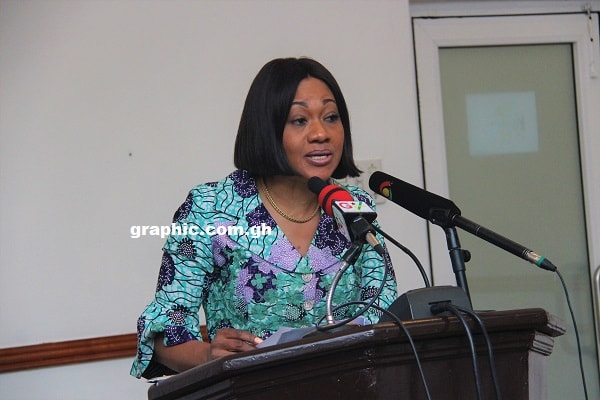
NDC’s claims about overprinting of ballot papers misleading, Integrity of ballot papers intact - EC
The Electoral Commission (EC) has assured all stakeholders in Ghana’s electoral process that each ballot paper printed for the December 7, 2020 elections will be accounted for.
“Not one ballot paper will be included in a package that has not been accounted for. This will not happen. Our processes are open, transparent and robust and will remain so,” it said.
A statement signed by the Chairperson of the EC, Mrs Jean Mensa, and issued in Accra yesterday, therefore, urged the public to disregard the attempts by the National Democratic Congress (NDC) to cause fear and panic and heighten tension in the lead up to the December elections.
It said the EC found it difficult to understand why the NDC would “seek to cause fear and apprehension around a transparent and open process such as the printing of ballots. This is unacceptable”.
Context
Last Sunday, the NDC, at an emergency press conference, levelled a number of accusations against the EC.
Among others, it claimed that the EC was printing in excess of 150,000 ballot papers at the blind side of political party agents; that the ballot papers were without serial numbers and that the alleged excess ballot papers were being printed at another unit of the Assembly Press, which was headed by an appointee of the President.
Extra ballots
The EC statement explained that it had been a standard practice since 1992 for the commission to print ballot papers in excess of five per cent to cater for instances such as spoilt ballots, saying the present EC had not changed that practice.
“In line with this policy, all printing houses have been directed to print the 2020 ballot papers in excess of five per cent for all 38,630 polling stations across the country,” it said.
Also, it maintained that since 1992, ballot papers for both the presidential and parliamentary elections were printed in booklets of 10, 25, 50 and 100 for all polling stations.
“As such, a polling station that has, for example, 90 voters will be provided with a ballot booklet that contains 100 ballots or two booklets of 50 ballots each, since a special booklet could not be printed for the exact number of 90 voters,” it said.
- Read also:
- NDC raises issues with printing of excess ballot papers for 2020 polls
- EC responds to NDC's concerns on printing of excess ballot papers for 2020 polls
Contingency
The statement said after adding a contingency of five per cent to the 90 voters, the number of ballots would increase to about 95.
“This is the situation that pertains in several polling stations. This cannot be avoided because it is impossible to print separate booklets for each polling station based on the number of registered voters at that particular polling station,” it said.
It said that had always been the practice and the NDC was well aware of that.
“The transparency and openness of the process makes it impossible for any printing house to manipulate and compromise the process, as all printing is done in the full glare of the agents of the political parties,” it added.
No serial numbers
On the allegation of not providing the political parties with the serial numbers of the ballot papers, it said the EC had never provided the parties with the serial numbers of ballot papers, pointing out that the commission could not generate the serial numbers of all 17 million plus ballot papers.
The statement said the serial numbers were generated by the printing houses and were provided to both the commission and the parties after each batch of printing was completed.
“The packaged/bagged ballots are sealed by both the EC and the political parties. Indeed, a party fixes its party seal on the packaged ballot papers.
The parties take a record of all seal numbers on each packaged ballot. The packing of the ballots is undertaken in the presence of all the agents of the political parties,” it pointed out.
It said on Election Day, the parties certified all serial numbers on each packaged ballot before the ballots were opened, adding that “the serial numbers are also recorded on the Statement of Poll before voting commences”.
Printing houses
It mentioned Buck Press Limited, Assembly Press (Ghana Publishing Company), Acts Commercial Limited, Fonstat Limited, Yasarko Limited, Innolink and Checkpoint Limited as the printing houses appointed to print the Election 2020 ballot papers.
It said those companies had been involved in the printing of ballot papers for the EC at various points in time from 1992 to 2004.
The statement pointed out that it was well-known that the Assembly Press was a state institution which, at any point in time, was headed by appointees of an incumbent government.
“It is also a well-known fact that the Assembly Press, headed by appointees of the NDC, printed the 1992, 1996, 2000, 2012 and 2016 ballot papers,” it said.
It stressed that in spite of who headed the Assembly Press, “the effective monitoring and participation by the parties and the security agencies in the commission’s printing processes make it impossible for any printing house, be it state-owned or private, to manipulate and compromise the printing process”.
#GhanaVotes2020
